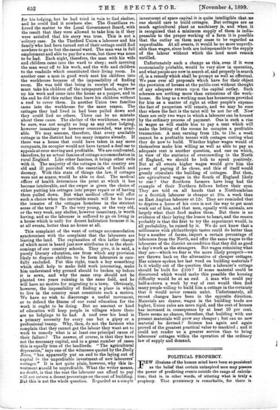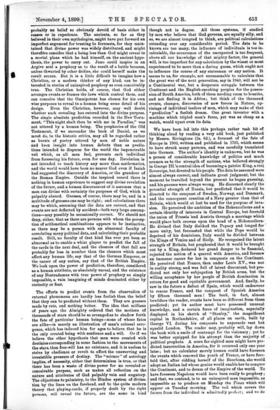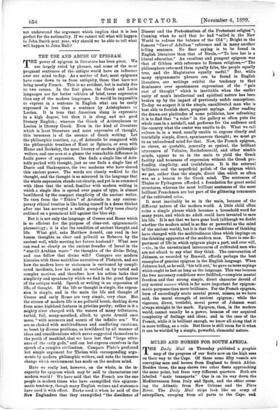POLITICAL PROPHECY. F EW illusions of the human mind have been
so persistent as the belief that certain uninspired men may possess the power of predicting events outside the range of calcula- tion; that is, in other words, of uttering what is truly a prophecy. That persistency is remarkable, for there is probably no belief so obviously devoid of basis either in reason or in experience. The ancients, so far as they believed in their own mythologies, might have put forward an imperfect argument for trusting to forecasts, for they main- tained that divine power was widely distributed, and might therefo-re consider that a being less than God might reveal to a mortal plans which he had himself, on the ancient hypo- thesis, the power to carry out. Juno could inspire in an Argive soul a prophecy as to the result of a battle because, unless thwarted by other deities, she could herself make the result secure. But it is a little difficult to imagine how a Christian, or a modern thinker of any kind, can be in- terested in stories of uninspired prophecy as even conceivably true. The Christian holds, of course, that God either arranges events or frames the laws which control them, and can conceive that the Omnipotent has chosen for his own wise purposes to reveal to a human being some detail of his design. Even the Christian, however, may well doubt whether such revealing has entered into the divine purpose. The single absolute prediction recorded in the New Testa- ment, "This night shalt thou be with me in Paradise," was not uttered by a human being. The prophecies of the Old Testament, if we surrender the book of Daniel, as we must do, to the historic critics, may all be regarded rather as bursts of poetry uttered by men of noble nature and keen insight into human defects than as predic- tions intended to disperse for the world the impenetrable veil which, as all men feel, prevents each individual from foreseeing his future, even for one day. Revelation is not intended to teach history any more than mathematics, and the world would have been no nearer God even if Isaiah had suggested the discovery of America, or the grandeur of the Roman Empire. Outside the inspired record there is nothing in human experience to suggest any divine revelation of the future, and a human discernment of it assumes that a man can divine with certainty the purposes of God, which is palpably absurd. Guesses, of course, there may be, and in a multitude of guesses one may be right; and calculations there, may be which, assuming that the data are correct, and that events are not deflected by accident—both very large assump- tions—may possibly be occasionally correct. We should not deny, either, that as there are persons with whom the percep- tion of arithmetical combinations appears to be instinctive, so there may be a person with an abnormal faculty of correlating many political data, and calculating their probable result. Still, no faculty of that kind has ever yet been so abnormal as to enable a whist player to predict the fall of the cards in the next deal, and the chances of that fall are probably far less in number than the chances which must affect any human life, say that of the German Emperor, or the career of any nation, say that of the British Empire. We look upon the power of prediction, therefore, considered as a human attribute, as absolutely unreal, and the existence of any Nostradamus with true power of prophecy as simply impossible, a vain imagining of minds dominated either by curiosity or fear.
The efforts to predict events from the observation of external phenomena are hardly less foolish than the belief that they can be predicted without them. They are guesses made by rule, and nothing better. The idea that millions of years ago the Almighty ordered that the motions of thousands of stars should be so arranged as to shadow forth the fate of particular human beings—none of whose fates are alike—is merely an illustration of man's colossal arro- gance, which has induced him for ages to believe that he is the only created being with sentience and a will. Or if we believe the other hypothesis that men were created with destinies corresponding in some fashion to the movements of the stars, then free-will has no existence, and it is useless to strive by obedience or revolt to affect the unswerving and irresistible pressure of destiny. The "science" of astrology implies, of necessity, either that determinism is true, or that there has been a waste of divine power for no revealed or conceivable purpose, such as makes all reflection on the nature and attributes of God palpably vain and nugatory. The objections to palmistry, to the Hindoo system of divina- tion by the lines on the forehead, and to the quite modern theory that playing-cards, if properly dealt by the right persons, will reveal the future, are the same in kind
though not in degree. All those systems, if studied by men who believe that God governs, are equally silly, and so, we are almost tempted to think, are political calculations extending over any considerable period. The data to be known are too many, the influence of individuals is too in- calculable, the occurrence of the unexpected is too frequent, above all our knowledge of that mighty factor, the general will, is too imperfect for any calculation by the wisest or most experienced to be more than a daring guess, which ought not to influence the course of any statesman or any nation. It seems to us, for example, not unreasonable to calculate that the great war of the next generation, say in 1940, will not be a Continental war, but a desperate struggle between the Continent and the English-speaking peoples for the posses- sion of South America, both of them needing room to breathe, and not finding it in Africa; but think of the thousand events, changes, discoveries of new forces in Nature, up- risings of individual leaders of men, which may make of that "prediction" a foolish dream. One great inventor with a machine which tripled man's force, yet was as cheap as a watch, would upset even its data
We have been led into this perhaps rather rash bit of thinking aloud by reading a very odd book, just published by Messrs. Rivingtons (2s. 6d.), a forecast of the fate of Europe in 1900, written and published in 1763, which seems to have struck many persons, and was carefully translated into German. The author's identity is unknown, but he was a person of considerable knowledge of politics and much acumen as to the strength of nations, who believed strongly in George III.'a central idea of becoming a patriot King, a real Sovereign, but devoted to his people. The data he assumed were almost always correct, and indicate great judgment, but the moment he travelled beyond the present he began guessing, and his guesses were always wrong. He discerned clearly the potential strength of Russia, but predicted that it would be directed to the conquest of Sweden, Norway, and Denmark, and the consequent creation of a Navy greater than that of Britain, which would at last be used for the purpose of inva- sion. He perceived the ambition of the Hohenzollerns and a certain identity of interests in Central Europe, but foretold the union of Prussia 'and Austria through a marriage which would place both crowns upon the head of a Hohenzollern. He divined that Italy disliked the Papacy and longed for • more unity, but forecasted that while the Pope would be deprived of his dominions, Italy would be divided between the Kings of Venice and of Sicily. He recognised the latent strength of Britain, but prophesied that it would be brought out by a King, declared her grand danger to be financial, rejected the notion of a quarrel with America, and foresaw an immense career for her in conquests on the Continent. He perceived that France, then under Louis XV., was not in reality strong, and was full of latent discontent, but pre- dicted not only her subjugation by British arms, but the willing acceptance by her people of British domination in return for good and equitable government. And, finally, he saw in the future a defeat of Spain, which would endeavour to rescue France, and the conquest of Spanish America by fifteen thousand men ! The book, in fact, almost bewilders the reader, events have been so different from those predicted ; yet its author must have possessed unusual knowledge, and a certain force of imagination, especially displayed in his sketch of " Stanley," the magnificent capital in Rutlandshire, of all places on earth, built by George VI. during his conquests to supersede vast but squalid London. The reader may, probably will, lay down the book with a smile of contempt for the visionary ; yet be was better equipped for his attempt than the majority of political prophets. A more far-sighted man might have pre- dicted insurrection in America, for it occurred only one year later; but no calculator merely human could have foreseen the events which renewed the youth of France, or have fore- told that, after ridding herself of the Bourbons, she would adopt an Italian lad whose genius would enable her to conquer the Continent, and to dream of the Empire of the world. To have foreseen Napoleon would have been really to prophesy ; and that, we contend, is to an uninspired man impossible, as impossible as to produce on Monday the Times which will appear on Tuesday morning. The veil which covers the future froth the individual is admittedly pel het; and we do
not understand the argument which implies that it is less perfect for the nationality. If we cannot tell what will happen to John Smith next year, why should we be able to tell what will happen to John Bull ?
























































 Previous page
Previous page